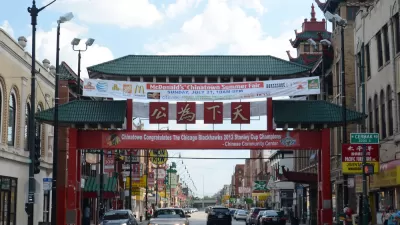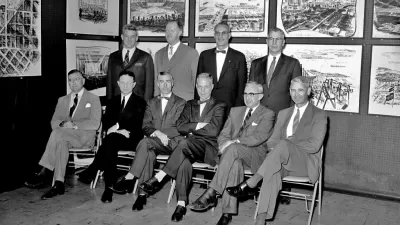Some of the opinions of Michael Bloomberg, billionaire candidate for president, haven't aged well since his time as the mayor of New York City.

Former New York City Mayor Michael Bloomberg is being introduced to a more national political audience as the presidential primaries finally arrive—and comments about stop-and-frisk policing policy as well as the connections between the Great Recession and the historic practice of redlining, are raising questions about the former mayor's opinions on race.
Kriston Capps explains the circumstances around the most recent round of controversial comments from Bloomberg's past as mayor of New York:
At a Georgetown University forum in September 2008, then-New York City mayor Michael Bloomberg was asked about the major economic story of the day: the roots of the exploding global financial crisis. This was the month that Lehman Brothers had filed for bankruptcy and the federal government had placed Fannie Mae and Freddie Mac into conservatorship. What was behind the bust?
Bloomberg’s answer: The implosion of the nation’s housing market was the result of the prohibition of redlining, the discriminatory practice by which lenders denied African-American homebuyers access to loans in the same neighborhoods where white homeowners lived.
Capps speaks to Keeanga-Yamahtta Taylor, professor at Princeton University and author of Race for Profit: How Banks and the Real Estate Industry Undermined Black Homeownership, for an aexplanation fo the problematic nature of those remarks.
Capps also notes that Bloomberg was far from the only public figure to share that opinion at the outset of the Great Recession:
Still, commentators at Fox News and The Wall Street Journal’s op-ed page often insisted that lax standards that encouraged uncreditworthy minority borrowers were to blame. Former presidential candidate Steve Forbes and former Republican House Majority Leader Dick Armey propped up an Astroturfed site, AngryRenters.com, that claimed to represent the voice of renters infuriated with mortgage bailout efforts. Fox Business’s Neil Cavuto said that “loaning to minorities and risky borrowers is a disaster.”
Capp provides these authoritative takes on the causes of the Great Recession and Bloomberg's problematic argument: "The bipartisan U.S. Financial Crisis Inquiry Commission also concluded that fair-lending regulations were not to blame for the financial crisis (with one dissenting conservative saying otherwise). Bank of America’s then-chief executive Brian Moynihan defended fair lending law."
FULL STORY: What Redlining Had to Do With the 2008 Financial Crisis

Maui's Vacation Rental Debate Turns Ugly
Verbal attacks, misinformation campaigns and fistfights plague a high-stakes debate to convert thousands of vacation rentals into long-term housing.

Planetizen Federal Action Tracker
A weekly monitor of how Trump’s orders and actions are impacting planners and planning in America.

In Urban Planning, AI Prompting Could be the New Design Thinking
Creativity has long been key to great urban design. What if we see AI as our new creative partner?

Cal Fire Chatbot Fails to Answer Basic Questions
An AI chatbot designed to provide information about wildfires can’t answer questions about evacuation orders, among other problems.

What Happens if Trump Kills Section 8?
The Trump admin aims to slash federal rental aid by nearly half and shift distribution to states. Experts warn this could spike homelessness and destabilize communities nationwide.

Sean Duffy Targets Rainbow Crosswalks in Road Safety Efforts
Despite evidence that colorful crosswalks actually improve intersection safety — and the lack of almost any crosswalks at all on the nation’s most dangerous arterial roads — U.S. Transportation Secretary Duffy is calling on states to remove them.
Urban Design for Planners 1: Software Tools
This six-course series explores essential urban design concepts using open source software and equips planners with the tools they need to participate fully in the urban design process.
Planning for Universal Design
Learn the tools for implementing Universal Design in planning regulations.
Appalachian Highlands Housing Partners
Gallatin County Department of Planning & Community Development
Heyer Gruel & Associates PA
Mpact (founded as Rail~Volution)
City of Camden Redevelopment Agency
City of Astoria
City of Portland
City of Laramie





























